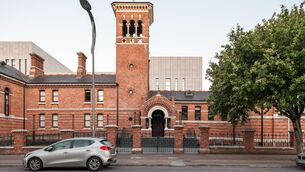Ibec: Housing challenges affecting Cork's competitiveness

Helen Leahy IBEC Head of Regional PolicyI, Fergal O’Brien, Executive Director, Lobbying and Influence, Ibec and Michael O’Flynn, Chairman and CEO, O’Flynn Group. Photography By Julien Behal
Housing challenges are harming Cork’s attractiveness and competitiveness, according to Ibec.
The Irish business group met with business leaders in Cork this week to discuss housing as part of its ongoing ‘Better Lives, Better Business’ campaign.
Ibec recently published a housing report proposing a suite of measures to speed up the delivery of housing and improve viability and affordability.
The group found that the short supply of available housing in Cork has resulted in a lack of competitiveness for outside companies, whose employees fail to find affordable housing.
“The housing crisis has increasingly become a concern for younger workers, in particular," Panellist Michael O’Flynn, Chairman and CEO, O’Flynn Group said at the event. "They are financially pressed by ever-higher rents and the receding prospect of homeownership. This ultimately spills over into issues around well-being and productivity in the workplace.
Helen Leahy, Ibec's Head of Regional Policy said 'housing is a key component of competitiveness, it impacts on the attractiveness of Ireland as a location for investment'.
“A well-functioning housing sector is critical to the overall health of society and the economy and has a direct impact on the cost of living and wage demands," she said. "The primary challenge is to deliver a housing supply sufficient to meet demand at a price level that is affordable, accessible and sustainable.”
The National Planning Framework (NPF) anticipates that Cork will become the fastest-growing city region in Ireland, with a projected 50-60% increase in its population by 2040.
A recent survey, commissioned by Ibec and carried out by Amárach found that 59% of people in Cork said their general quality of life had disimproved in the last five years, just 1% lower than the national average.
When asked what would make the biggest difference in improving their quality of life, people in Cork rated more affordable housing (23%) most highly.
“There is a need to reinvigorate the policy drive around the availability and affordability of housing in the context of these challenges," Ms Leahy said. "This will require a suite of measures to improve the viability and affordability of homebuilding, such as addressing emerging financing deficits, reform of the planning and procurement system to speed delivery, a ramping up of ambition in affordable and cost-rental housing, and significant investment in skills and modern methods of construction.
"From an affordability perspective, our proposed fiscal measures would reduce the cost of a typical €400,000 new home by €30,000 and this could be achieved with immediate effect."
The group believe that sustainable and tangible improvements in quality of life are required if Cork is going to continue to be a great place to do business.







 App?
App?


